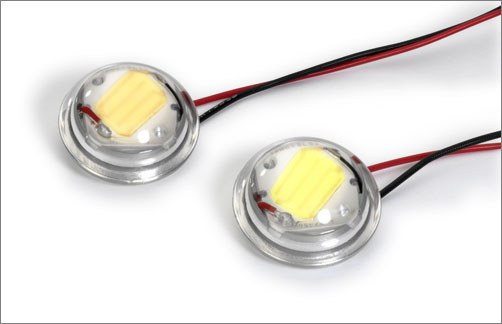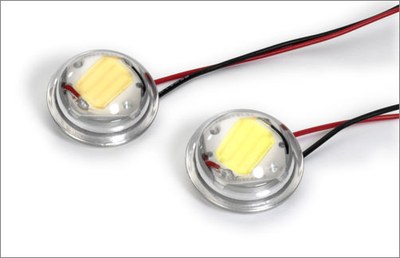LED Light Precisely Focused
Unlike conventional lighting systems that radiate their light all around, LEDs already have the advantage that they emit their light under defined angles of radiation. This reduces divergence losses to a minimum. However, as a rule, optics are necessary to focus and distribute the light cones from LEDs according to the requirements of the light manufacturer.
To demonstrate a suitable system approach for LED lighting applications, Sharp offers far more than just its LED component portfolio. Supported by optic specialists IdeaLED, DFO and LEDiL, the Japanese company will also be introducing the appropriate optics designed especially for the DoubleDome, Zenigata, and MiniZeni series types. The bandwidth of the lenses suitable for Sharp LEDs is broad and ranges from selectively focused spotlights to broader spotlights with angles of radiation of about +/- 30°. Even lenses for lamps with three and more LEDs and different attachment methods – screwing, gluing, clipping – are available in the product lines from Sharp’s partners.
IdeaLED has even developed a process for the Zenigata modules to connect the optic directly to the module, thus encapsulating the LED module. These so-called “encapsulated Zenigata” LED modules can be used directly as lighting for downlights, for example.
To achieve this product diversity, both optic specialists rely on lenses made of special plastics that are designed for temperatures of well over 100°C. Compared to reflector-based optics, lens systems generally have two advantages. First of all, most lenses are more efficient because all of the LED light is guided through the lens and concentrated there while in the case of reflectors, the portion of light that does not hit the reflector is radiated out, and not concentrated. Secondly, lenses can protect the lighting equipment against dust, dirt, spray water, and mechanical loads so that with lenses lamps can easily achieve the IP 65 safety class. Lenses also offer pricing advantages because expensive galvanisation processes for coating reflectors and covering the optic lens with protective glass are not necessary.
Compared to glass lenses, plastic lenses also have the advantage of being lighter in weight, more malleable and easier to process. Due to the combination of different lens geometries, light cones can also be purposely shaped into lines or crosses, for example. For large quantities, plastic lenses are additionally considerably less expensive than comparable optics made of glass.
The availability of the products and components mentioned in this press release is restricted to the European markets. For availability of these products and components outside Europe, please check with the Sharp Device Sales Offices in the respective markets.
About Sharp Microelectronics Europe:
Sharp Microelectronics Europe, Hamburg, Germany, is a divisional company of Sharp Electronics (Europe) GmbH, which is a subsidiary of Sharp Corporation, Osaka, Japan. Sharp is a worldwide developer of core digital technologies shaping the next generation of electronic applications and products. With a portfolio of more than 2,000 components in the ranges of TFT LCDs in screen sizes up to 108 inches, high brightness white and colour LEDs, optoelectronics, CCD and CMOS camera sensors, photovoltaic components, RF-, IC- und LSI-components as well as advanced packaging and integration skills Sharp Microelectronics Europe offers groundbreaking solutions in particular for applications in automotive electronics, mobile / communications technology, industrial automation, TV- and consumer electronics, e-signage and LED based lighting technology. Sharp is dedicated to the improvement of people’s lives and environmental protection through the use of advanced technologies. Technology and product development at Sharp is strongly determined by innovation, quality, usability and saving of resources.


